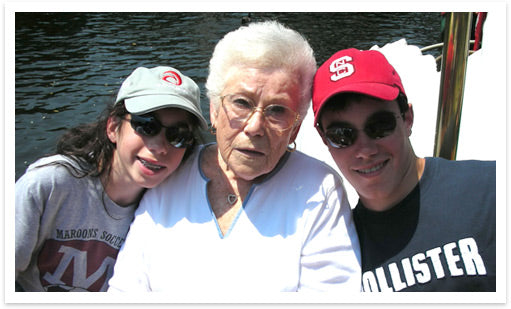
"We had a great 80th birthday celebration up in Boston with the kids, at one of her favorite restaurants, the whole works – then six months later, she hit a bad downhill patch." That is how David Zoll remembers beginning the process of becoming the primary caregiver for his aging mother, Shirley.
"We lost my father 30 years ago – he was 50 at the time and I had just graduated from high school," David recalls. "My mother became fiercely independent. She worked as a bookkeeper until she was over 70, back before most of the record-keeping was done on computers."
When Shirley was about 80, David started noticing some minor issues, a fall here and there (nothing broken), some memory loss, but, all in all, "nothing serious. But in the back of your mind you start to wonder...and then she hit a bad patch. Over an eight-month period, she had a heart attack, and while recovering from the angioplasty, she fell and broke her shoulder in two places. Then she was debilitated, and had two more heart attacks after that."

Shirley, David Zoll's mother, enjoyed her 80th birthday with her two grandchildren, Jeremy (right) and Allie (left), along with David and his wife Lori, at the Public Gardens and Swan Boats in Boston.
The road to learning
David and Shirley's story is probably similar to a lot of others, because people are living longer but not always in the best of health, particularly in their later years. Adult children are most often there to pick up the pieces when a crisis happens, and find their way to the best care, living arrangements, and financial situation for their parent going forward. Unfortunately, finding your way in the maze of caregiving issues is often like searching for a light switch in the dark – as David found out.
David brought Shirley from Boston to New Jersey (his home state) for medical care and physical therapy for her shoulder. "She was in and out of the hospital more times than I can count." Then the caregiving battle started. "I remember that she was about to be released from the hospital in two or three days, and I was told that I needed to take her for 'subacute' rehabilitation. Well, now I know what that means but at the time I was clueless. I asked the hospital for recommendations of facilities and they said, 'we don't make recommendations.' All they would do was give me a list of places, and I was left on my own to figure out what to do."
David and his wife, Lori, visited a few of the places on the list from the hospital, but were sorely disappointed. He turned to the Internet for information, but came up just about empty. "I found an article here, some information there, but I couldn't find what I really needed."
Care manager savior
Finally, after speaking with some friends, David got a recommendation to contact a professional care manager for assistance. He hired Nancy Bortinger, LCSW, who helped guide him through the process – logistically and emotionally. "She helped us find a nursing home with a high-quality subacute wing, but my mother was afraid she would never come out – it was a very sensitive, emotional matter. Nancy provided great input regarding what to do and how to handle the emotional side of things. She was our savior."
After a stay in subacute care, Shirley was able to go back to living in her own home in Boston with the assistance of home care aids. "At that time, we were going to look into assisted living, but my mother's fierce independence came into play. She wanted to go back to Boston."
A sudden change
After 18 months of living at home, Shirley suffered a serious setback: a mysterious, debilitating illness that came out of nowhere. Upon regaining her health, she went back to subacute care for further treatment, and agreed to a brief respite at an assisted living facility for an additional period of recovery. As it turned out, she enjoyed the sociability, support and independence the facility afforded her. She had her own apartment, but also had access to activities and amenities that were not available at home. And, for the first time in a long time, she had the daily social interaction she thrived on. At that point, she and David agreed that the best environment for her was an assisted living care facility.
Parentgiving: helping others find their way
Parentgiving grew out of David's desire to help others mine the field of caregiving issues. "In a calmer time, when my mother was out of the hospital and settled, I started to rethink the process and assess the needs for people in a similar situation."
"My experience was very stressful for me and my family. After living through it and learning a thing or two about being a caregiver, I would like to make it easier for others when they are faced with similar issues."
Enter Parentgiving.com. "I want Parentgiving to be the place where caregivers go to plan, learn, obtain professional elder care coaching, and resolve issues with as little stress as possible."
